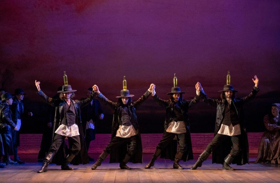Review: Catch FIDDLER ON THE ROOF at Hippodrome Through 11/19/2018

"Without our traditions, our lives would be as shaky as a fiddler on the roof," says Tevye, the main character in the opening sequence of beloved show FIDDLER ON THE ROOF. Naturally, this is a show about 'traditions,' the tradition of parents providing as best they can for their children, of children defying their parents, of tightly knit communities loving and quarrelling, and of the persecution of the Jewish people. The Jewish traditions highlighted within the context of the show are quite lovely but perhaps irrelevant; this show is about cultural genocide in pre-revolutionary 20th-century Russia.
Hey, remember the Russian pogroms of the 1890s through the 1940s that resulted in the massacre of hundreds of thousands of Jewish civilians? Wouldn't that make a great musical? The term 'pogrom' is defined as 'to destroy, to wreak havoc, to demolish violently,' and is applied to mean government sanctioned violence against a targeted minority population. The term is also applied retroactively to ethnic cleansing activities, particularly against Jews, dating back to the 1300s.
From the late 1890s to 1914, Jewish writer Sholem Aleichem wrote stories based on a Jewish village in the Pale of Settlement of Russia, which was a containment area arranged by Catherine the Great after her attempts to completely expel Jews from Russia were unsuccessful. Jews were subsequently not allowed to live 'beyond the Pale.' Aleichem's stories of Tevye the Dairyman were the source material for the musical, book by Joseph Stein, music by Jerry Bock and lyrics by Sheldon Harnick. Inspiration for the title, however, was provided by Marc Chagall, born Moishe Zakharovich Shagal in Vitibsk, Belarus in 1887, himself narrowly surviving (by lying) the pogroms within the Pale. After his escape to France, Chagall's paintings often contained elements of his young life in the shtetl.
Considering the current rise of virulent anti-Semitism in our country, a tour of FIDDLER ON THE ROOF seems to make sense as a cultural rallying cry, to remind ourselves that we should be better than this by now, that one group of people blaming another for something or other is often a profiteering tactic. Though we didn't realize it at the time, this was heinously illustrated on that very night. During intermission, while my friend and I were out of the theater, there was an incident in the balcony at the Hippodrome. A man began shouting "Heil Hitler, Heil Trump," leading to panic among audience members, who feared a shooting, and swift action by security, who ensured there wasn't one. Is this our new normal?
Since we didn't witness the drama in the balcony, our attention is focused on the drama onstage. Despite this not being an Equity tour, it's beautifully done. There are a couple of awkward tech moments involving apparatus onstage, but the sound system works perfectly and the orchestra is wonderful. Production values are high- I am particularly fond of the specialty costumes for Tevye's nightmare sequence, and of the Fiddler's shimmering purple frock-coat.
Director Bartlett Sher's conception of the piece is a tribute to the manifestations of the show's first director/choreographer, Jerome Robbins, whose name is prominent in the program. Tradition! It's nice to see familiar things updated but not bastardized. The cast is consistently wonderful, movement, vocals, all of it. I quite enjoy each of the musical numbers and am impressed by the excellent dancing throughout the show, and the staging of sequences that don't technically qualify as dances, in particular the second half of Act II.
So much depends on the lead character, Tevye, and his delivery. The construct of his short soliloquies directed at G*d gives a narrative to the show, without the artificiality of "little did I know" foreknowledge. Israeli actor Yehezkel Lazarov has not only the warmth and gruffness required of the role, but excellent timing as well. He's a pleasure to watch in his performance, and his duet "Do You Love Me?" with Maite Uzal as Golde is a theatrical treasure of character revelation.
I found street parking across from Lexington Market, 2 blocks north of the Hippodrome. Meters are in effect until 8 pm Monday through Saturday. My friend and I had a drink and a bite at Forno, where reservations are made up to a year in advance by season ticket holders. They could get us in for dinner at 7:30, they said. We said we'd sit at the bar, and were lucky enough to spot some folk vacating their seats.
My hearing-impaired companion went to the Patron Services window near the box office to borrow an Assistive Listening device for the show. The one she was given didn't function properly, so at Intermission, she exchanged it for a different one... which also didn't work. A musical is so dependent on the audience members being able to hear and understand the dialogue and the lyrics, so when the assistive devices are non-functional, it is a grave disappointment to the alternatively-abled audience members and those who love them. It made me very sad on my friend's behalf. I explained to her what had happened as best I could.
FIDDLER ON THE ROOF is a wonderful show about joy amidst harsh circumstances, the importance of family and community. It is also a warning, albeit with songs and dancing. What could be more appropriate right now?
Run Time: Two hours with one 15 minute Intermission.
FIDDLER ON THE ROOF runs November 13-19, 2018 at The Hippodrome Theatre, 12 N. Eutaw St., Baltimore, Maryland. Call 1-800-343-3103, or visit france-merrickpac.com.
Photo Credit: Joan Marcus
Reader Reviews

Videos

